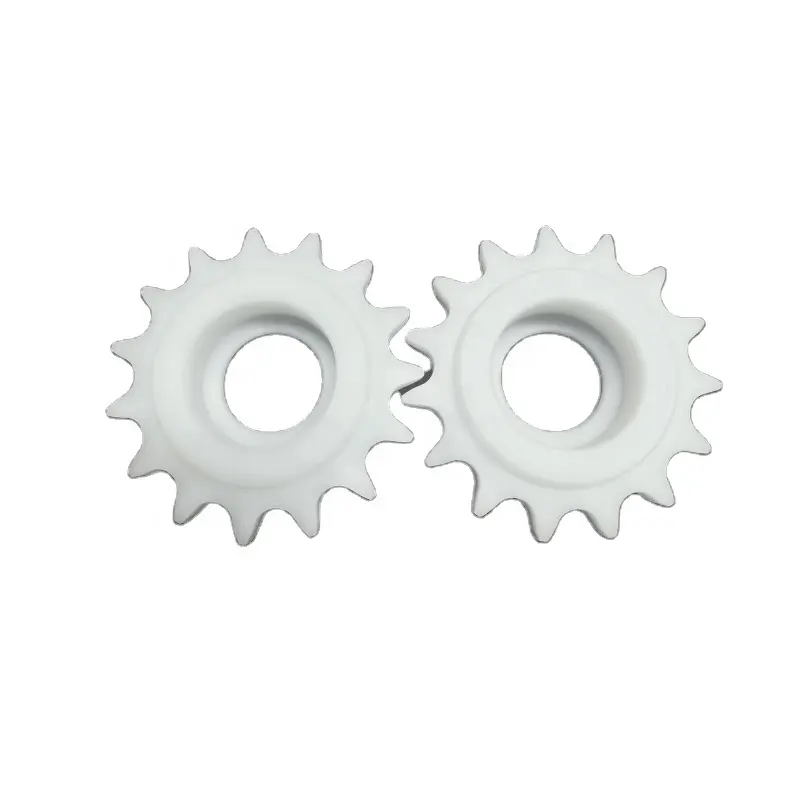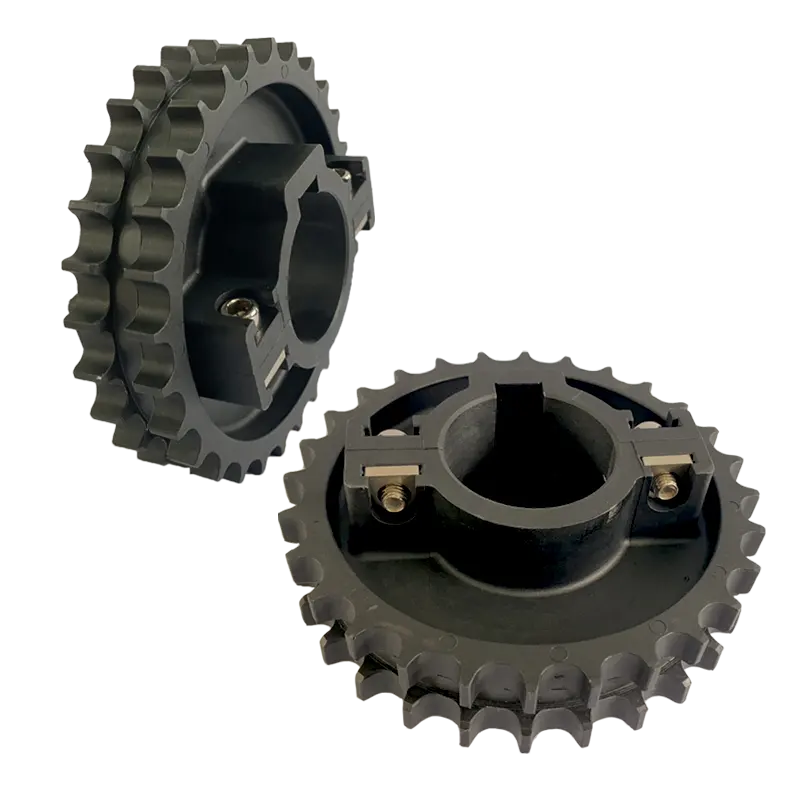Product Description
| Products | Gear |
| Module | M0.5-M10 |
| Precision grade | DIN6, DIN7, DIN8, DIN10 |
| Pressure angle | 20 degree |
| Material | C45 steel, Stainless steel 304, Plastic, Brass, 20CrMo,40Cr and so on |
| Heat treatment | Hardening and Tempering, High Frequency Quenching,Carburizing etc |
| Surface treatment | Blacking, Polishing, Anodization, Chrome Plating, Zinc Plating, Nickel Plating |
| Application | Precision cutting machines. Lathes. Milling machines. Grinders. Automated mechanical systems. Automated warehousing systems. |
| Machining process | Hobbing, Milling, Drilling, Shaving, Grinding |
Companies strictly enforce the ISO9001(2008)international quality certification system,
the product quality conforms to the eu RoHS standard.Specializing in the production of “engineering plastic accessories” of high-tech enterprises, the company has a set of
imported production equipment and CNC processing equipment, processing means advanced, strong technical force.Q1. We don’t have drawings, can we produce according to the samples we provide?
A1. OK
Q2. How to customize plastic parts?
A2. Customized according to drawings
Q3. Can I make a sample for testing first?
A3. OK
Q4. How long is the proofing cycle?
A4. 2-5 days
Q5. What are your processing equipment?
A5. CNC machining center, CNC lathe, milling machine, engraving machine, injection molding machine, extruder, molding
machine
Q6. What craftsmanship do you have for processing accessories?
A6. According to different products, different processes are used, such as machining, extrusion, injection molding, etc.
Q7. Can injection products be surface treated? What are the surface treatments?
A7. OK. Surface treatment: spray paint, silk screen, electroplating, etc.
Q8. Can you help assembling the product after it is made?
A8. OK.
Q9. How much temperature can the plastic material withstand?
A9. Different plastic materials have different temperature resistance, the lowest temperature is -40ºC, and the highest
temperature is 300ºC. We can recommend materials according to the working conditions of your company.
Q10. What certifications or qualifications does your company have?
A10. Our company’s certificates are: ISO, Rohs, product patent certificates, etc.
Q11. How scale is your company?
A11. Our company covers an area of 2,000 square CZPT and has 100 employees. /* January 22, 2571 19:08:37 */!function(){function s(e,r){var a,o={};try{e&&e.split(“,”).forEach(function(e,t){e&&(a=e.match(/(.*?):(.*)$/))&&1
| Application: | Motor, Electric Cars, Motorcycle, Machinery, Marine, Toy, Agricultural Machinery, Car |
|---|---|
| Hardness: | Soft Tooth Surface |
| Gear Position: | External Gear |
| Manufacturing Method: | Cast Gear |
| Toothed Portion Shape: | Spur Gear |
| Material: | Nylon |
| Customization: |
Available
| Customized Request |
|---|
Can plastic sprockets be used in food processing and packaging equipment?
Yes, plastic sprockets can be used in food processing and packaging equipment, and they are commonly chosen for such applications due to their specific advantages:
- Corrosion Resistance: Plastic sprockets are highly resistant to corrosion, making them ideal for environments where food products, cleaning agents, and water are present.
- Non-Toxic and Food Safe: High-quality plastic materials used in sprockets are non-toxic and approved for food contact, ensuring they do not contaminate the food products being processed or packaged.
- Self-Lubricating: Many plastic sprockets have self-lubricating properties, reducing the need for additional lubrication, which could otherwise come into contact with food products.
- Lightweight: Plastic sprockets are lightweight compared to metal sprockets, which can be advantageous for minimizing the overall weight of food processing equipment.
- Quiet and Smooth Operation: Plastic sprockets can operate with reduced noise levels, making them suitable for environments where noise control is essential.
- Easy to Clean: Their smooth surface and resistance to chemicals make plastic sprockets easy to clean, ensuring proper hygiene standards are met.
- Low Maintenance: Plastic sprockets often require less maintenance compared to metal sprockets, contributing to cost savings and increased uptime.
However, when selecting plastic sprockets for food processing and packaging applications, it is crucial to consider the specific requirements of the machinery and the type of food being processed or packaged. Different plastic materials may have varying levels of temperature resistance, load-carrying capacity, and chemical compatibility.
Always choose sprockets that comply with food industry regulations and standards, such as FDA and EU food contact regulations, and follow the manufacturer’s guidelines for proper use and maintenance.
Can plastic sprockets be customized or modified for specific applications?
Yes, plastic sprockets can be customized or modified to meet the specific requirements of different applications. One of the significant advantages of plastic sprockets is their versatility in design and manufacturing. Manufacturers can tailor the sprockets to suit various applications by considering factors such as:
- Material Selection: Depending on the application’s needs, different types of plastic materials can be used to manufacture the sprockets. Each plastic material offers unique properties like wear resistance, chemical resistance, and temperature tolerance.
- Size and Pitch: Plastic sprockets can be manufactured in various sizes and pitches to match the specific chain or belt requirements of the machinery or conveyor system.
- Number of Teeth: The number of teeth on the sprocket can be adjusted to achieve the desired speed ratio and torque transmission.
- Bore Size: The bore size of the sprocket can be customized to fit different shaft diameters.
- Hub Configuration: Manufacturers can design the hub of the sprocket to fit various mounting options, such as QD (Quick Detachable), taper lock, or plain bore.
- Keyway and Set Screw Options: If required, keyways and set screws can be added to provide additional security and prevent slippage.
- Special Coatings: For specific applications where additional protection is necessary, plastic sprockets can be coated or treated to enhance their performance and durability.
Customized plastic sprockets are commonly used in industries with unique requirements, such as food processing, pharmaceuticals, and corrosive environments. When seeking custom plastic sprockets, it is essential to work closely with a reputable manufacturer or supplier who can provide expert advice and ensure that the sprockets are precisely tailored to your application’s needs.
What are the common applications of plastic sprockets in various industries?
Plastic sprockets find widespread use in various industries due to their unique properties and advantages. Some of the common applications include:
- Food and Beverage Industry: Plastic sprockets are commonly used in conveyor systems for food and beverage processing and packaging. Their corrosion resistance and ability to meet food-grade requirements make them ideal for this industry.
- Material Handling: Plastic sprockets are widely used in material handling equipment such as conveyor belts, bucket elevators, and chain conveyors. They are lightweight and offer low friction, reducing the overall energy consumption and wear on the equipment.
- Packaging Industry: Plastic sprockets are used in packaging machinery for applications like carton forming, labeling, and product handling. Their self-lubricating properties and resistance to chemical exposure are beneficial in this industry.
- Agriculture: Plastic sprockets are employed in various agricultural machinery, including grain augers, seeders, and harvesters. Their resistance to moisture and chemicals, along with their lightweight nature, makes them suitable for agricultural applications.
- Automotive Industry: Plastic sprockets are used in automotive seat tracks, sunroof mechanisms, and other components where weight reduction and corrosion resistance are critical factors.
- Textile Industry: In the textile industry, plastic sprockets are used in spinning and weaving machines. Their low friction and wear-resistant properties contribute to the smooth operation of these machines.
- Packaging and Printing: Plastic sprockets are employed in packaging and printing machines to handle paper, cardboard, and other materials. Their lightweight design reduces the overall load on the machine’s components.
- Medical and Pharmaceutical: Plastic sprockets are used in medical devices and pharmaceutical equipment where corrosion resistance and cleanliness are essential.
- Chemical Industry: Plastic sprockets are employed in chemical processing equipment due to their resistance to corrosive substances and chemicals.
- General Industrial Applications: Plastic sprockets find use in various general industrial applications where their unique properties, such as lightweight, low friction, and chemical resistance, offer advantages over metal sprockets.
It’s important to select the appropriate plastic material based on the specific application requirements and operating conditions to ensure optimal performance and longevity.
editor by Dream 2024-05-06




